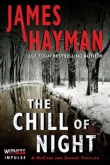
Текст книги "The Devil's Garden"
Автор книги: Richard Montanari
Жанры:
Маньяки
,сообщить о нарушении
Текущая страница: 22 (всего у книги 22 страниц)
FIFTY-NINE
A year after the horrible incidents in Eden Falls and Astoria, New York, a young woman stood across the street from the Pikk Street Café. Even there, on the corner, the air was rich with the aromas of cinnamon and marzipan and dark chocolate.
Inside, the owner of the café, a man of just thirty-six years, but one whose sandy hair was already shocked with gray, stacked boxes in the back room. There was never enough space.
At just after nine AM, after the morning rush had subsided, he stepped behind the counter. There were three customers at the tables, each lost in their coffee, their pastries, their copies of that morning’s Eesti Ekspress.
When they decided to move to Estonia, they knew that Michael would never again practice law. The day he was to return to the Queens County District Attorney’s office, he stood in Dennis McCaffrey’s office, surrounded by his colleagues and friends. Because there had been no hard evidence that Michael had broken the law, no charges were filed regarding the adoption of the girls.
But there would always be a wariness surrounding Assistant District Attorney Michael Roman. And the DA’s office – any DA’s office – could not afford a cloud of suspicion. He tendered his resignation that day.
And although they had both taken a blitz Berlitz course in Estonian, it was Abby who excelled. She applied to the Estonian government, and within six months would take the first of two boards she would need to work as a nurse in this country.
As for the art of baking, Michael found that he took to it like a natural. He recalled watching his father in front of the ovens, the choreography of an artisan, a master of his craft. Michael was far from perfecting his pirukad, but was beginning to get repeat customers.
When he finished filling the lunch orders for the nearby hotels, he poured himself a cup of coffee. The girls were sitting at a table in the front window, giggling, as always, with some private, mysterious knowledge. When Michael looked out the window he saw a woman standing on the corner, watching the girls. His senses alerted, as they would forever be when it came to Charlotte and Emily, he moved closer. When he saw the young woman’s face his heart stuttered, as if he had suddenly found the second half of a long-forgotten locket.
The woman noticed him, raised a delicate hand to wave.
Michael ran out the front door of the bakery, but by the time he reached the corner, the woman was gone, lost in the crowd of commuters and tourists on Pikk Street.
When he stepped back inside, Abby was waiting for him by the door.
“Did you see that woman?” he asked. “The blond woman in the red coat?”
“She was just in,” Abby said. “She was sitting in the corner.” She pointed to the table by the radiator.
Michael crossed the room. On the table sat a white napkin, and on it was drawn a beautifully detailed pencil rendering of a hillside cemetery. In the center was a small cross. There was no headstone, no name, but Michael knew whose resting place it was, and what it meant.
They say he consorted with a girl in Ida-Viru County. An ennustaja. She bore him three children, but one was stillborn.
“Something wrong?” Abby asked, stepping beside him.
Michael considered telling his wife. Instead, he put the napkin in his pocket, and said:
“It’s a beautiful day. Let’s close a little early.”
A few hours later they sat on the shore at Pirita Beach, not far from the Olympic Yachting Centre, the host site of the 1980 Moscow Olympics. The wind was strong, and the air a little chilly – the beaches of Tallinn did not get crowded until late June – but the water glistened and the breeze carried the pledge of another summer.
After lunch the girls walked down to the water. Back to back, with little tree branches in hand, they made drawings in the wet sand. Charlotte etched something that looked like a mountain. Emily drew a horse. Or maybe it was a camel.
Michael gazed out over the Gulf of Finland. In the six months before they left the states, the girls had gone through intense counseling. According to the therapists, there did not appear to be any lasting trauma from the events of spring, 2009, but there existed the possibility that one day the terror they had experienced would return. Only time would tell.
Later, as they packed their things and headed to the car, Michael turned to look one last time at the sand drawings, but found that the tide had already come in and washed them away.
That evening, in the small flat over the café, with the girls fast asleep, and his wife engrossed in a book beside him, Michael held the napkin the woman had left on the table, and considered his beliefs, his faith in this life, and the knowledge that there was no eternity, no forever.
For the Roman family – Michael, Abby, Charlotte, and Emily – there was only now.
EPILOGUE
December. Snow fell gently over eastern Estonia, coating the hills, dusting the tall, imperial pines. The young man with a finger missing from his right hand stood looking out the window of a house set atop a hill in Kolossova. He had read about what happened on the Internet. The newspapers said that Aleksander Savisaar was some kind of monster, that he had terrorized a family in New York City.
Villem Aavik knew the truth.
When Savisaar left more than a year ago, he told Villem many things, had entrusted him with a great many responsibilities, not the least of which was the care of the house, the grounds, the animals. With both parents dead, Villem saw Savisaar as much more than just a father figure. He was the thing of myth. He was vennaskond.
Villem looked at the wall of knives in the study, each one a work of art. He took one from the rack, opened it, fingered the blade.
He had read all the books in the small library, knew all the names: Baba Yaga, Koschei Besmertney, Baš Čelik, Ivan, Marya, Anna, Olga. He had listened many times to Stravinsky’s The Firebird, his confidence growing with each hearing. He had memorized every note from Rimsky-Korsakov’s opera Kashchey the Immortal.
Immortal, he thought. He was young, just sixteen, but the idea enthralled him.
Forever.
He looked out the window again, at the blackness of the winter night. He had lost the finger in a foundry accident, but the fable would ultimately be whatever he said it was. He had already begun to visit Savisaar’s accounts along the Narva, dealing with the provincial roimar who at first did not take him seriously. Villem Aavik made an example of one man in a farm village near Värska. In time his legend would precede him.
And there would be time enough. There was a girl in a nearby town, a girl they say will one day be ennustaja. She was only eleven years old, but already people were bringing to her their tales of unfaithful husbands, dying mothers, and lottery dreams.
One night, when the rue flowers were in bloom, and the Narva River ran silent, he would visit her.
Villem sat before the fire, his stomach full, the house and grounds secure. In a few days, a new year would begin.
Outside, in the soundless white of the countryside, a pair of silver eyes watched. And waited.








